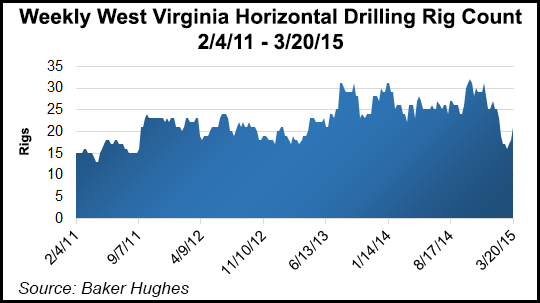Marcellus | NGI All News Access | Utica Shale
West Virginia Inks Ohio River Lease Deal with Statoil
The West Virginia Department of Commerce has reached a lease agreement with Statoil ASA to allow the producer to drill for oil and gas below the Ohio River.

The deal represents the first time in more than two decades that the state has leased a parcel along the river and it’s the first leasing of such property to an operator since it opened miles to bids last year. Josh Jarrell, general counsel for the state commerce department, said the agency is in the “final stages” of reaching lease agreements with both Gastar Exploration Inc. and Noble Energy Inc. as well, with deals likely in the coming weeks.
Statoil, headquartered in Norway, agreed to a four-year lease at $8,125/acre for one mile along the river. It also secured the mineral rights for another two miles for the same term, Jarrell said, agreeing to pay $9,000/acre for that segment. Both leases would pay West Virginia 20% royalties, as the state had requested.
Gastar bid $3,500/acre for two miles, while Noble also bid $3,500/acre for an eight mile segment and another $5,125/acre for the rights to a creek that bisects some of its existing assets in the region. All the land along the river that has been leased or that is under negotiation is in Marshall, Wetzel and Tyler counties, where operators have seen successful results from the Marcellus and Utica shales.
West Virginia is no stranger to leasing its mineral rights, but while conventional drilling has occurred near the river in the past, operators had yet to turn their wells horizontally to target source rocks underneath the river. When the state opened bids last year, officials said operators had initiated the process and had been interested in the prospect for some time (see Shale Daily, Oct. 3, 2014). The state saw an opportunity to capitalize, Jarrell said.
Since then, the state has created a website where operators can either nominate a property they’re interested in bidding on, or submit bids on posted property. As a result, additional acreage is to be available along the river and on other state-owned land. The state took bids for a wildlife conservation area in Tyler County in November (see Shale Daily, Nov. 26, 2014).
But Jarrell said the downturn in commodity prices has factored heavily into negotiations on current bids, with operators expressing uncertainty about whether they’ll have the resources to develop the leases with budgets already strained by lower oil and gas prices.
“We likely would have had all this land locked up by now if it weren’t for the downturn in oil and gas,” Jarrell said.
He added that Noble plans to reevaluate its bid to determine if it can proceed with plans for the leases it’s working to finalize, which has delayed that deal. When the state first opened bids along the river, Triad Hunter LLC, an affiliate of Magnum Hunter Resources Corp., had bid for nearly all the available land. The company was also selected as a winning bidder, but rescinded its proposals before negotiations began, Jarrell said (see Shale Daily, Oct. 30, 2014).
© 2024 Natural Gas Intelligence. All rights reserved.
ISSN © 2577-9877 | ISSN © 2158-8023 |
